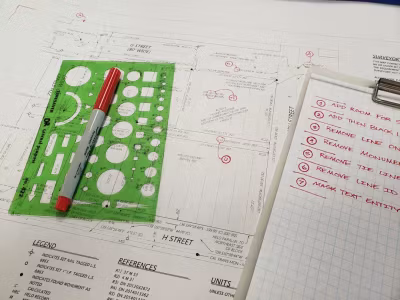Whether you're a homeowner planning a renovation or a developer managing a large-scale project, your construction contract serves as the foundation for your entire venture. This document isn't just paperwork—it's your blueprint for success and your primary protection against costly disputes.
Unfortunately, many people make critical errors when signing these agreements. These mistakes can lead to project delays, budget overruns, and expensive litigation. Understanding these common pitfalls can help you avoid them and set your project up for success.
Why Construction Contracts Matter
A construction contract defines the responsibilities of all parties involved and protects your interests throughout the project. Without careful attention to contract details, you may find yourself facing unexpected costs, timeline disputes, or quality issues that could have been prevented.
As experienced construction attorneys, we've seen these same mistakes repeated across countless projects. Here are the five most critical errors to avoid:
1. Incomplete Scope of Work
The Problem
One of the most frequent and costly mistakes is failing to clearly define what work will be performed. Vague language or missing details create confusion and disputes between parties.
What Goes Wrong
When the scope of work is unclear, disagreements arise over:
What materials should be used
Which tasks are included in the original contract
What constitutes "completion" of the project
Who pays for unexpected but necessary work
The Solution
Ensure your contract thoroughly outlines:
All work to be performed
Specific materials and their quality standards
Project timelines and milestones
Any special requirements or preferences
Clear definitions of project completion
For more guidance on essential contract elements, review our guide on understanding construction contracts.
2. Ignoring Change Order Procedures
Why Change Orders Matter
Changes are inevitable in construction projects. Without proper procedures in place, these modifications can quickly spiral out of control and destroy your budget.
Common Issues
Problems arise when contracts fail to address:
How changes will be requested and approved
Who has authority to authorize changes
How additional costs will be calculated
Timeline adjustments for changes
Documentation requirements
Best Practices
Your contract should include clear provisions for:
Written change order requirements
Approval processes and authorization levels
Cost calculation methods
Timeline impact assessments
Required signatures and documentation
Learn more about managing project changes in our article on how to draft effective change orders in construction contracts.
3. Overlooking Payment Terms
The Risk
Payment disputes are among the most common sources of construction conflicts. Unclear or unfair payment terms often lead to project delays and strained relationships between parties.
Key Payment Issues
Watch out for problems with:
Vague total contract pricing
Unrealistic payment schedules
Unclear conditions for withholding payments
Missing dispute resolution procedures
Inadequate protection against mechanics' liens
Essential Payment Provisions
Your contract should clearly specify:
Total contract price and payment breakdown
Payment schedule tied to project milestones
Conditions that justify withholding payments
Interest rates for late payments
Dispute resolution mechanisms
Lien waiver procedures
Understanding different payment structures is crucial. Review our explanation of pay-if-paid vs. pay-when-paid clauses to protect your interests.
4. Inadequate Insurance and Indemnity Provisions
Understanding the Risks
Construction projects involve significant risks, from property damage to personal injury. Without proper insurance and indemnity provisions, you could face substantial financial liability.
Critical Coverage Areas
Your contract should address:
General liability insurance requirements
Workers' compensation coverage
Property insurance obligations
Professional liability coverage
Minimum coverage amounts and policy terms
Indemnity Considerations
Include provisions that:
Allocate responsibility for potential losses
Define which party handles specific types of claims
Establish defense obligations
Clarify coverage for third-party claims
For construction workers, understanding workers' compensation protections is equally important.
5. Failure to Review Legal Terms
The Critical Error
Perhaps the most dangerous mistake is signing a construction contract without thorough legal review. These documents contain complex legal language that can significantly impact your rights and obligations.
Why Professional Review Matters
Construction contracts include sophisticated provisions covering:
Dispute resolution procedures
Warranty terms and limitations
Liability allocation
Termination rights
Compliance requirements
Important Contract Clauses
Pay special attention to:
Warranty and guarantee provisions
Dispute resolution mechanisms
Termination clauses
Change order procedures
Payment terms and lien waivers
Our guide on key clauses in builder contracts that homeowners should watch for provides detailed insights into critical contract provisions.
Additional Considerations
Contractor Licensing and Permits
Verify that your contractor is properly licensed and will obtain all necessary permits. Working with unlicensed contractors can create serious problems, including difficulties with mechanics' lien enforcement.
Clear Communication
Establish clear communication protocols and documentation requirements. Poor communication often leads to misunderstandings that could have been easily avoided.
Quality Standards
Define quality standards and inspection procedures to ensure work meets your expectations and building codes.
Taking Action
Signing a construction contract is a significant commitment that deserves careful attention and professional guidance. By avoiding these common mistakes and seeking qualified legal review, you can protect your interests and set the foundation for a successful project.
Remember that construction law is complex, and each project has unique considerations. Professional legal guidance can help you identify potential issues before they become costly problems and negotiate terms that protect your interests throughout the construction process.
Have Questions About Construction Contracts?
Our experienced construction defect attorneys are here to help. Schedule a free 15-minute screening call to discuss your situation.




